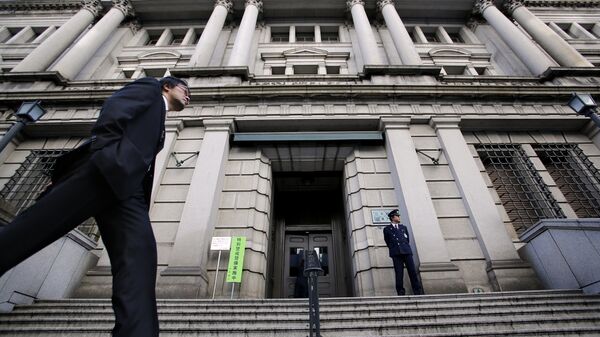The BOJ's announcement comes despite both the US Federal Reserve and the European Central Bank (ECB) signalling possible rate cuts this year to thwart the darkening economic outlook.
During a new conference after the policy meeting, BOJ Governor Haruhiko Kuroda said risks to global economic growth are increasing. Kuroda pointed to the lingering threat of escalation in trade tensions between the US and China, the uncertainty in global financial markets, as well as the softening global demand for consumer and manufactured goods.
Statement on Monetary Policy https://t.co/oyG2XeEej0
— Bank of Japan (@Bank_of_Japan_e) 20 июня 2019 г.
The BOJ's interest rates stand at -0.1 percent, while its guidance for benchmark 10-year government bond yields remains at zero percent.
"We’ve continued to balance the benefits and costs of our tools in guiding monetary policy, and believe we can keep doing so. This is an approach we’ll take if the momentum for achieving our price target is lost and we would consider additional monetary easing steps", Kuroda said.
The BOJ also said it would keep buying corporate bonds at a pace of $743 bln per year to support the corporate sector with stable cash injections as trade worries mar their profits outlook.
Economists point out the BOJ is currently in the wait-and-see mode, as its monetary policy moves greatly depend on US Fed's policy decisions and their impact on the yen's FX rate. If the Fed cuts rates anytime soon, the yen would appreciate against the dollar, weighing on the Japanese inflation rate.
"There’s a good chance the Fed will cut rates in July. If that happens, the BOJ will strengthen its forward guidance to keep yen rises in check", Izuru Kato of Totan Research said.
Meanwhile, Japan's inflation rate has been below the BOJ's target of 2 percent – meaning if downward pressures on the growth in price increase, the central bank would have to cut rates deeper into the negative territory.
Some experts suggest the BOJ's push to revive Japan's business activity by implementing accommodative monetary policies fell short of achieving that goal.
Back in 2013, the BOJ took its first steps towards the ultra-loose borrowing costs and massive bond purchases – and, albeit Japan has managed to sustain modest GDP expansion rate ever since, the economy is still tepid. Some believe the Japanese economy finds itself on life-support, and a removal of the BOJ's stimulus would cause a deep and lengthy recession.
In January 2016, the lights were on past midnight on the seventh floor in the Bank of Japan. Inside, a handful of bureaucrats were working on a plan to fire up the economy. It didn’t work. Read the behind-the-scenes account here https://t.co/xNj3BgAcj8 @LeikaKihara pic.twitter.com/4PyukJ6A1o
— Reuters Top News (@Reuters) 17 июня 2019 г.
However, the BOJ says the Japanese economy will likely continue to expand at a modest pace going forward, regardless of trade concerns and the risks to domestic consumption. Officials say even if a new economic crisis hits the island nation, the BOJ has sufficient tools to fight the malaise.
"As for monetary easing tools, we can cut our short-and long-term interest rate targets, ramp up asset purchases or accelerate the pace of increase in base money. There is no change to our view to ponder various ideas, including a combination of these steps, depending on what’s most appropriate at the time", the BOJ said in a statement.
Over the past two years, the majority of economists expected further normalisation in monetary policies worldwide – including in Japan – in the form of gradual interest rate hikes, cuts and cancellations of bond purchase schemes, and reductions in central banks' balance sheets.
After three hasty bond market interventions, the Bank of Japan has announced it won't be joining the world's other central banks in unwinding its stimulus programme. Governor Haruhiko Kuroda also says interest rates will remain low for an extended period https://t.co/WHCjUBLpRM pic.twitter.com/k1i0wDNPZS
— Financial Times (@FinancialTimes) 1 августа 2018 г.
Now, however, the broader sentiment is gradually shifting towards the expectations of a new era of 'quantitative easing', or ultra-loose monetary policies aimed at preventing the next global economic crisis.
The BOJ could join this forming trend, which could make the negative interest rate regime (NIRP) the 'new normality' not only in Japan and the Eurozone, but far beyond.



